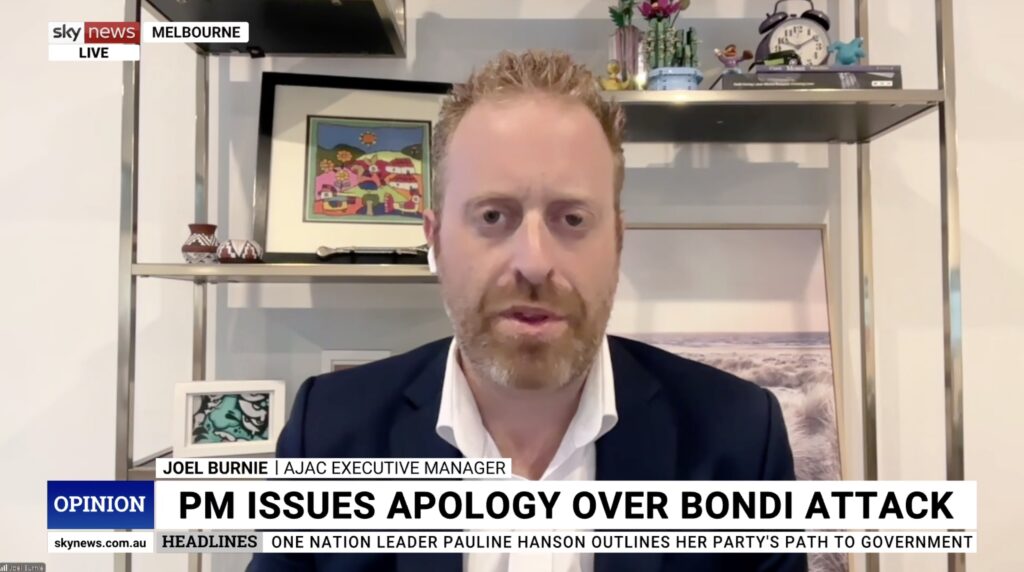IN THE MEDIA
AIJAC’s Ahron Shapiro discusses Jerusalem disturbances and Israeli coalition negotiations on ABC News Radio
May 10, 2021

AIJAC’s Ahron Shapiro discussed the Jerusalem disturbances and Israeli coalition negotiations on ABC News Radio with Glen Bartholomew, 10 May 2021.
TRANSCRIPT
Glen Bartholomew: Well, Israeli Prime Pinister Benjamin Netanyahu has defended police action against Palestinian protestors. So after a third night of heavy skirmishes in East Jerusalem, scores of injuries have been reported as tensions between Israelis and Palestinians boiled over around the Al-Aqsa mosque and Jerusalem’s old city in recent days.
It comes as Benjamin Netanyahu fights for his political future. After failing to form a government by last week’s deadline. Ahron Shapiro is senior policy analyst at the Australia, Israel Jewish affairs council, and joins us one more. Good morning.
Ahron Shapiro: Good morning, Glen.
Glen Bartholomew: How do you describe what’s going on in Jerusalem right now? Why is it happening?
Ahron Shapiro: Well, Glen, you know, Ramadan is a month that is very Holy in the Muslim calendar. And, uh, unfortunately when it comes to Jerusalem, which is a hot point and a site of Holy sites, including Islam’s, one of its most major Holy sites, Judaism’s biggest holy sites, it’s a flashpoint.
And, and historically, if you go back, I think, uh, some statistics I saw was that, uh, [the] chance of, of terror attacks or violence increases by about 200% in the month of Ramadan than it does any other time of the year. And this year there’s a lot going on. And I think that, while things have been quiet during the coronavirus period, I think none of these issues went away. And there was also this other issue about disputed housing in the Sheikh Jerrah neighborhood. And all of this came to a head at once. And unfortunately we’re seeing the product of this.
Glen Bartholomew: And indeed that does seem to be stemming from this plan, the eviction of Palestinian families from their homes in a part of these areas by Jewish settlers. The possible evictions, certainly leading to some tensions.
Benjamin Netanyahu says Israel claims ownership of all of Jerusalem, but that claim is not widely recognized. Is it?
Ahron Shapiro: Well, it depends what you call ownership. You know, Israel has always felt that they are the custodians of a city that’s holy for many peoples, and that they take care of the freedom of religion, the peace, and for the most part and people who live there – I lived there for 10 years – it works extremely well in a very diverse area, more than any other city and perhaps in the entire region. No other city, do you find so many diverse peoples living side-by-side and for the most part successfully.
I don’t think that, uh, what Netanyahu’s saying here is that – he’s not talking about a particular house or a particular place, he’s saying that Israel’s – he’s trying to reassert Israel’s right to administer the city much as its capital much in the way that other people have. You know, Jordan once had Jerusalem, East Jerusalem. And they had their opinions about it. And this is a disputed area, but Israel has a claim and they’re making that claim and it is Israel’s capital. And he’s just making that very firm. I think this is a position that’s very popular in Israel.
Glen Bartholomew: What about that point being firm, and how popular that is Benjamin Netanyahu saying the country will not allow any extremists to destabilize Jerusalem. Could his move to evict Palestinians be designed to, to play to his strengths as the strong man leader who stands up to the Palestinians, a way of trying to generate some support and perhaps distract from his other political problems?
Ahron Shapiro: Well, I don’t. I think you could read that in two ways. I think that there’s a recognition that there are people who put their agendas ahead of, of everyone else. I think you see that on the Palestinian side, and you see that Israeli side. You have people who are, who are very shortsighted and they don’t look at the big picture of what it’s doing to the whole society.
So right now Israel’s High Court has, has postponed any decision on these houses. And I think that’s a very wise move. I think now’s not the time for these discussions. I think that none of these issues are going to go away, but, I think there are inflamed people on both sides right now. And if I think if Netanyahu had specified which extremists, that would be one thing. But if he just said extremists, I think that’s something that actually, is something we could actually agree on.
Glen Bartholomew: It comes as a Netanyahu fights for his political future. After failing to form a government by last week’s deadline, where do things stand now Could his party before just into opposition for the first time in 12 years.
Ahron Shapiro: Well, yes, and it didn’t have to be this way. Again, the right-wing parties, which are trying, which are trying to remove him, those factions people like the New Hope party of Gideon Sa’ar and Yemina’s Naftali Bennett. They’ve said that if Netanyahu were to step aside and somebody else in the Likud would take his place, the government could be formed with Likud, but as long as Netanyahu is in there, it’s a problem.
So right now, Netanyahu failed in his chance to form a government. And now it’s the other side’s chance on the other side has very good prospects right now. The climate is good, for some sort of a technocratic unity government that doesn’t put any of their – because it involves left wing and right wing parties – It, well, it won’t really make any moves on either of those hot button issues. And it will try to be as straight and narrow as it can, just get things done and, manage a budget and manage a defense. Uh, so that’s what they want to do. And they’re going to have to need the help of Arab parties to do it.
Glen Bartholomew: Hmmm!
Ahron Shapiro: And that’s where this whole problem in Ramadan and in Jerusalem, and these – this is where everything can really go sour because these Arab parties are under a lot of pressure to just step away from all this and, you know, and wipe their hands and say, we were going to engage in Israeli politics. But we can’t under these circumstances. Or they could go another way and they could go to the bargaining table and say, we want to get involved, but this is what we need from you. We need some, you know, a status quo promise in Jerusalem and things of that nature.
Glen Bartholomew: And that’s why the timing is so interesting.
We’ll see what the next couple of days bring and whether we can get a government together in Israel and avoid a potentially what fifth election in two years. Always plenty to talk about Ahron. Thanks for talking to us.
Ahron Shapiro: My pleasure, Glen.
Glen Bartholomew: Ahron Shapiro, Senior Policy Analyst with the Australia, Israel & Jewish Affairs Council.





